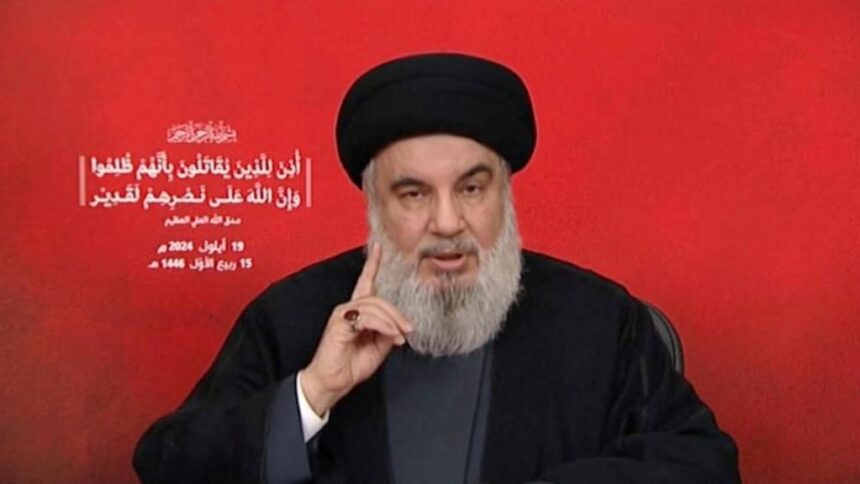By Nakiwala Barbra
The already volatile situation between Israel and Hezbollah has reached a new and deadly phase, with Israel’s military claiming to have killed Hezbollah’s leader, Hassan Nasrallah, in a series of airstrikes on Beirut on Friday.
The attack, which is reported to have targeted key Hezbollah strongholds in the capital, has yet to be confirmed by the militant group, but the escalation is sparking widespread concern over what comes next in this ongoing conflict.
The Israel Defense Forces (IDF) announced in a statement late Friday that they had successfully carried out airstrikes targeting Hezbollah’s leadership in the heart of Beirut, including the group’s top figure, Nasrallah. The news, if verified, marks a major blow to the militant group, which has been at the forefront of Lebanon’s armed resistance against Israel for decades. The IDF’s claims are part of its broader strategy to neutralize Hezbollah’s military leadership, following a significant rise in rocket attacks and violent exchanges along the Israeli-Lebanese border in recent days.
As the weekend began, the violence showed no signs of abating. Airstrikes continued to strike southern Beirut on Saturday morning, with bombings targeting the Dahieh area, a stronghold of Hezbollah’s military and political presence. BBC correspondents on the ground reported seeing thick plumes of smoke rising over several locations in the district. The strikes have reportedly intensified in the past 24 hours, as Israel’s air force continues to target what it claims are Hezbollah military infrastructure, including weapons caches and command centers.
Residents of southern Beirut have expressed growing fear as the conflict escalates, with many saying they have never experienced such sustained and relentless bombardment. “We are living in constant fear. The strikes are becoming heavier, and we don’t know what to expect next,” said one local, who requested anonymity for security reasons.
The heavy airstrikes have resulted in significant casualties. Lebanese authorities reported that six people were killed and at least 91 others wounded in the bombings on Friday alone. Hospitals in the capital are struggling to cope with the overwhelming number of wounded civilians, and many fear that the death toll could rise sharply in the coming hours as the strikes intensify.
Local officials stated that nearly 800 people have been killed in Israeli airstrikes across Lebanon since Monday, as the violence between Israel and Hezbollah reached unprecedented levels.
These figures are causing alarm in the international community, with calls for urgent ceasefire negotiations growing louder.
Despite the IDF’s bold claim of having killed Nasrallah, Hezbollah has yet to issue an official comment. The group’s leadership has remained silent on the matter, which has only fueled speculation about Nasrallah’s fate and Hezbollah’s next move.
The militant organization, known for its well-coordinated and sometimes clandestine operations, may be calculating its next steps before publicly confirming or denying the loss of its leader.
In past conflicts, Nasrallah has maintained a high profile, addressing his supporters via televised broadcasts and social media. His absence from public view has left some questioning whether he was indeed killed or whether Hezbollah is simply withholding information to prevent giving Israel the psychological upper hand.
For now, the question remains unanswered, but analysts warn that Hezbollah’s retaliation, whether immediate or planned for the future, could be catastrophic.
Hezbollah has long been an influential military force in the region, supported by Iran, and has built a network of supporters and fighters across Lebanon and Syria.
The loss of Nasrallah, if confirmed, would be a major blow to the group’s leadership. However, Hezbollah is not a one-man operation; it has a well-established command structure and a deep network of seasoned fighters, which means that the death of Nasrallah, while significant, may not result in a collapse of the organization.
The Escalating Cross-Border Attacks: Rockets Fired from Lebanon
On Saturday morning, the situation worsened as Israeli military sources reported that rockets had been fired from southern Lebanon into Israeli territory, prompting an immediate Israeli response.
The IDF stated that it had launched airstrikes targeting specific locations in the Bekaa Valley, a region known for Hezbollah’s military presence. This is the latest in a series of cross-border attacks that have seen Israeli forces retaliate against rocket fire from Lebanon.
The Israeli military’s response has been swift and devastating, as the IDF has launched targeted airstrikes on Hezbollah positions across Lebanon, escalating the already volatile situation. These airstrikes are part of Israel’s broader military campaign to curb Hezbollah’s growing influence in the region. In response, Hezbollah has reportedly launched rockets into northern Israel, signaling that the group is prepared to escalate the conflict further.
The cross-border exchanges are a stark reminder of how fragile the situation is in the region. In 2006, a similar conflict erupted between Israel and Hezbollah, which resulted in widespread devastation across Lebanon and northern Israel. The 34-day war left over 1,200 Lebanese and 160 Israelis dead, along with thousands more injured and displaced. Many fear that the current conflict could spiral into another all-out war, with catastrophic consequences for both Lebanon and Israel.
As the airstrikes continue and casualties mount, the humanitarian situation in Lebanon has grown increasingly dire. Thousands of civilians have been forced to flee their homes, particularly in southern Beirut and the Bekaa Valley, in search of safety.
The Lebanese government, already grappling with a severe economic crisis, is struggling to provide assistance to the growing number of displaced families. International humanitarian organizations are warning that the situation is rapidly becoming a full-blown humanitarian disaster, with the Lebanese population bearing the brunt of the violence.
Hospitals in Lebanon, already overwhelmed by the COVID-19 pandemic and economic collapse, are now facing a new crisis as they treat an influx of casualties from the airstrikes.
Medical supplies are running low, and hospitals are being overwhelmed by the sheer number of wounded. Medical staff are working around the clock, but the continued airstrikes make it increasingly difficult to provide adequate care to those in need.
The international community has been slow to react to the escalating conflict.







